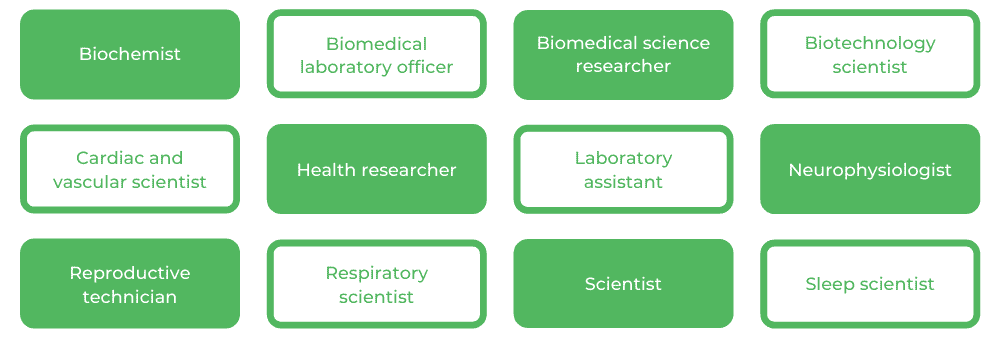Now you know the basic rundown of what a Bachelor of Biomedical Science at QUT is, you’re probably keen to hear more about what it’s really like!
Meet Bianca Momzon, a recent Biomed graduate, who told us her real thoughts about the degree.
Let’s dive in!
Why should you study a Bachelor of Biomedical Science at QUT?
Top 3 Pros of a Biomedical Science Degree
Top 3 Cons of a Biomedical Science Degree
Mistakes You Shouldn’t Make
Things to Know Before Starting a Bachelor of Biomedical Science at QUT
What Makes this Degree Different
Motivations for Studying a Bachelor of Biomedical Science at QUT
Potential Career Paths
Why should you study a Bachelor of Biomedical Science at QUT?
QUT offers a hugely flexible degree in Biomedical Science, with many different learning options and schedules. Bianca found this to be great as it “allows for balance with extracurricular commitments and personal life.”
If you’re looking for some extracurriculars to join specific to the degree, you should definitely check out the Biomedical Science Society at QUT!
Top 3 Pros of a Biomedical Science degree
#1: Flexibility in career options
“There’s an ability to forge careers in both research and clinical sciences,” Bianca said, noting that it allows students to try out both options and what might suit them.
It’s important to have flexibility in a degree, as it allows you to pursue what you’re real passionate about, or try your hand at different things.
Biomedical Science at QUT allows you to select one major and two minor study areas, as well as two electives from within any faculty at the university. This is a great opportunity to expand your skills with alternative electives, whilst earning credits to your degree!
#2: Specific to the human body
Bianca said this specificity was “opposed to a traditional science degree” which might not focus on the human body itself but other topics.
A degree in Biomedical Science allows you to study the body in huge detail, working with cadavers and patients. Bianca also noted that a lot of this knowledge was combined with “real world” practical skills which she found “could apply to both academic and industry settings.”
#3: Suitable if you’re planning on completing a post-graduate degree
This degree is great as not only a launchpad into a career in research or clinical sciences, but also into postgraduate studies.
Bianca called it “progressive preparation for postgraduate aspirations”, with many graduates looking to go into postgraduate research or medicine.
As part of the degree, you’ll work with leading researchers from the Institute of Health and Biomedical Innovation, the Translational Research Institute, and partner research facilities at major Brisbane hospitals. This sets you up with excellent contacts and networks going into your postgraduate studies!
Learn more about different tertiary qualifications here! Or the Top 5 Medical Schools in Australia if you’re considering Medicine.
Top 3 Cons of a Biomedical Science degree
#1: Can be too specific
This definitely isn’t a huge problem if you’re very keen on the specifics of Biomedical Science. However, if you’re looking for a more broad science degree, this might not be the one for you!
#2: Aspects of psychology and public health aren’t included
Aspects like these could come in handy down the track if you decide to pursue them in a postgraduate field.
Bianca noted an emphasis on different parts of psychology and public health “may or may not be complementary and beneficial to studies”. When you’re deciding what degree to do, keep your goals and aspirations in mind.
#3: Internships and placements aren’t compulsory
One key issue Bianca noted was the internships and placements are not compulsory. While they are highly recommend, and there are plenty available in both research and clinical issues, completing an internship is not a required part of your studies in Biomedical Science.
If you can, definitely do one as they are great for employability. You can complete Biomedical Work Integrated Learning A and B in research and clinical industries, organised by the Work Integrated Learning staff.
Any regrets?
Bianca regrets not completing an exchange with one of QUT’s partner universities. Exchange is an incredible formative experience, not just for your studies but also for your own personal growth.
Partners are in Africa, Europe, North and South America, Asia and New Zealand.
To learn more about exchange opportunities at QUT, head here!
What do you wish you had known before starting a Bachelor of Biomedical Science at QUT?
Bianca wished she had known more about what studying at university itself is like before she started. “I wish I knew that university structures, as in classes, schedules and facilities vary and that it’s important to ensure that the university choice and environment fits you as a student,” she shared.
What makes this degree different from the ones offered at other universities?
For Bianca, what made this the degree different is the “high flexibility for students schedules and areas of study to complete”. This is an excellent benefit, as students live very busy lives.
This was especially important for Bianca, as she was the Biomedical Science Society President in 2020, and is necessary for anyone looking to work while they study, as well as take part in campus life.
Bianca also enjoyed that “there is a large focus on practical knowledge and application” as this is what is necessary out in the field. At QUT, Biomedical Science students are expected to complete practical assessments, in the form of experiments, practical skills, and/or clinical measurements, or through OSCEs (objective structured clinical examination).
OSCEs assess how well you work in the field of health sciences by looking at your knowledge and skill level. These sorts of exams are completed in clinical settings, where you are expected to act out scenarios that apply to such a setting.
What inspired you to choose a Bachelor of Biomedical Science at QUT?
Bianca noted that QUT was in a good position for her, “It’s located in the heart of Brisbane city, so this urban university is highly accessible.”
Her decision was also aided by the fact that she “was interested in research and clinical sciences, and this degree combined these”. It’s a great, practical intersection of two specific scientific interests, that can then be further specialised in majors like anatomical sciences, cell and molecular biotechnology, human biochemistry, human physiology, clinical physiology, and infection and immunity.
There are also great options for a double degree with business, law, mathematics or data analytics.
What are the possible career paths?
Graduates of Biomedical Science traditionally enter these fields:
- Research
- Medicine
- Clinical sciences
- Academic roles
Specific careers for Biomed graduates include:
- Biochemist
- Biomedical Laboratory Officer
- Biomedical Science Researcher
- Biotechnology Scientist
- Cardiac and Vascular Scientist
- Health Researcher
- Laboratory Assistant
- Neurophysiologist
- Reproductive Technician
- Respiratory Scientist
- Scientist
- Sleep Scientist
Bianca intends to pursue the field of surgical cardio-thoracic medicine and clinical research.
Interested in other degrees within the field? Check out more info here!
Elizabeth Noonan is a Content Writer for Art of Smart and an undergraduate student at the University of Sydney. There, she studies a Bachelor of Arts/Advanced Studies, majoring in Media and Communications and French. Elizabeth is a huge movie buff and hopes to go into journalism after she finishes her degree.





